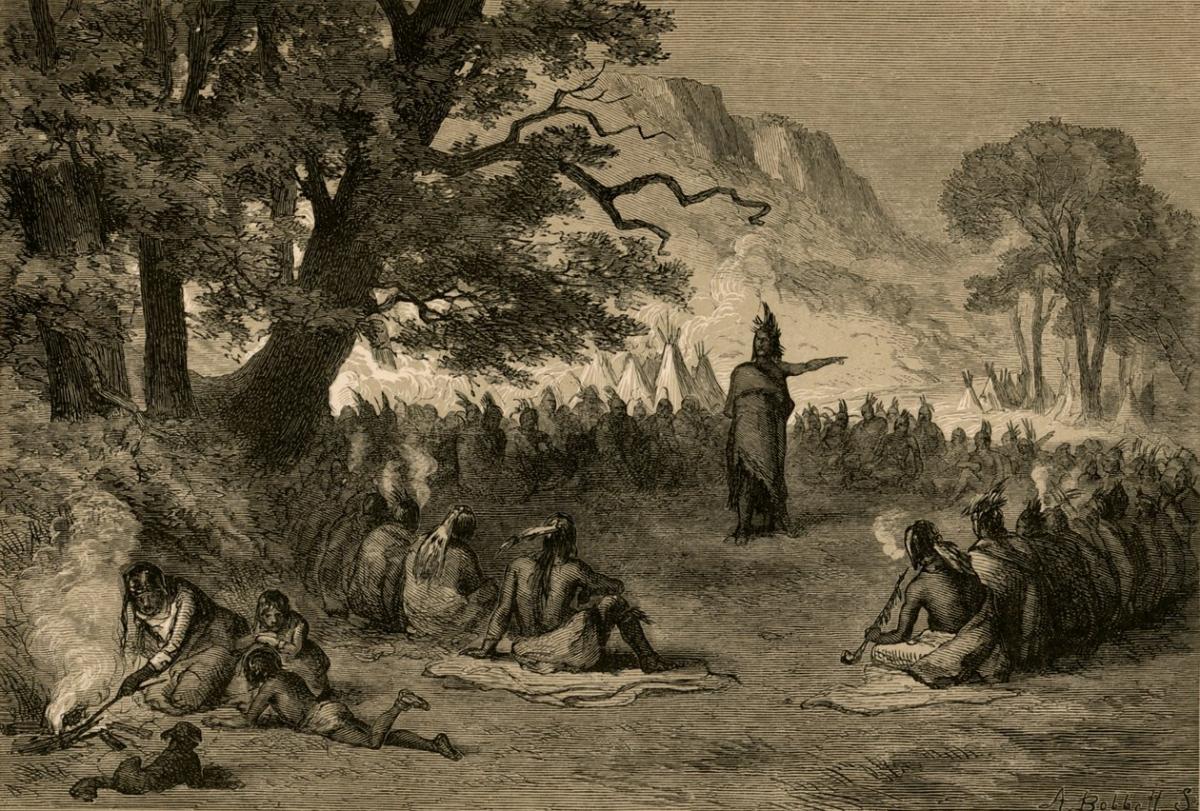This 1877 engraving by Albert Bobett is titled Pontiac in Counsil and it features Indian leader Pontiac as he gives his famous Speech at Detroit ("MeisterDrucke"). Pontiac was the leader of the Ottawa tribe that lived in modern-day Michigan and Ontario on both sides of what was Fort Detroit at the time (Maxwell 43). During this time, there was tension between the British colonists and the Ottawa tribe, as they continued to take control of and inhabit more of the Great Lakes region. In 1763, Pontiac gathered his tribe to announce his plans to attack Fort Detroit, which was one of the areas within their land that was occupied by the British ("Pontiac"). In this speech, Pontiac tells a story about a Native American that encountered the Great Spirit and was given directions to follow and share with his people. In a large portion of his speech, Pontiac quotes the Great Spirit’s message. He says that Great Spirit stated: “I am the Maker of mankind; and because I love you, you must do my will” (Levine 480). This is an important line in the speech because it puts into perspective the duty that the tribe members have to their spiritual leader, and it emphasizes the idea that everything following this statement from the Great Spirit must be taken seriously and must be obeyed. Therefore, when the Great Spirit says to “wipe them from the face of the earth, and then you will win my favor back again, and once more be happy and prosperous” (Levine 480), the people know that they must carry out his wishes. In this particular instance, the Great Spirit is referring to the Native American people striking back against the British to recapture the land in which Fort Detroit was built upon. It is also important to note that the Great Spirit says that the tribe has not yet won his favor over them. This implies that they have somehow disappointed him and that they can only restrengthen their relationship with him if they win back their land. Only then, will they be “happy and prosperous” again.
This was a good tactic used by Pontiac to rally the members of his tribe because he uses the Great Spirit’s words, which are honorable and true, to inspire the tribe to take part in this fight to win back their land from the British. In the end, it is unfortunate to report that the British had found out about Pontiac’s plan to attack the fort, and therefore the Ottawa tribe never took back this land.
Works Cited
Levine, Robert S., et al. The Norton Anthology of American Literature. Ninth ed., vol. 1, W.W. Norton & Company, 2022.
Maxwell, Thomas J. “Pontiac before 1763.” Ethnohistory, vol. 4, no. 1, 1957, pp. 41–46. JSTOR, https://doi.org/10.2307/480635. Accessed 17 Mar. 2024.
MeisterDrucke. “Pontiac in Council, 1877. by Albert Bobbett.” MeisterDrucke, www.meisterdrucke.uk/fine-art-prints/Albert-Bobbett/764023/Pontiac-in-C…. Accessed 17 Mar. 2024.
“Pontiac.” Encyclopædia Britannica, Encyclopædia Britannica, inc., www.britannica.com/biography/Pontiac-Ottawa-chief. Accessed 17 Mar. 2024.


